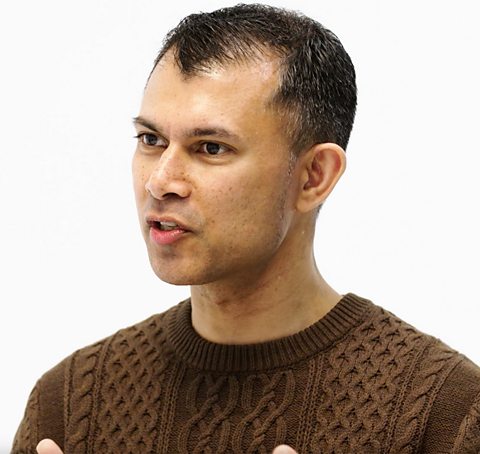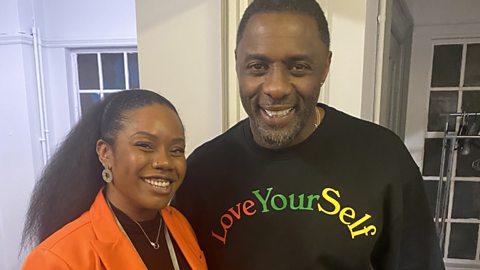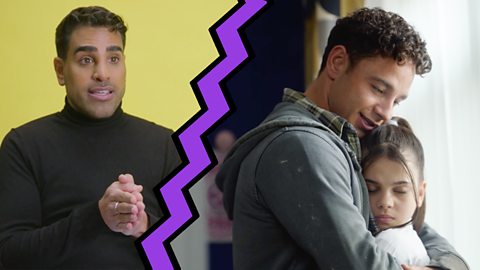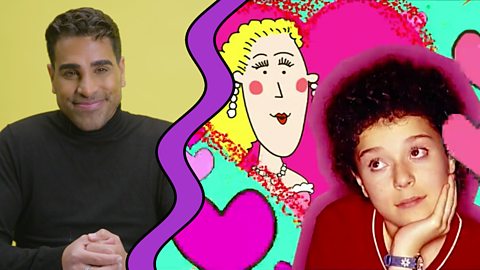Three generations of the same family sit around a table - what can they learn from each other?
According to , 49% of parents still feel that there is a stigma around their child having a mental health problem.
In this film, TV presenter and NHS clinician Dr Ranj reacts to real families as they play Never Ever Has My ChildÔÇĞ and discuss what their responses say about parenting and attitudes towards mental health today, compared to previous generations.
Dr Ranj: Hi everyone! IÔÇÖm Dr Ranj and this is Dr Ranj Reacts. │╔╚╦┐ì╩Í Bitesize ParentsÔÇÖ Toolkit have made a series of films where three generations of the same family play a game of Never Ever. So, IÔÇÖm going to check out what they have to say and react to what theyÔÇÖre telling us. LetÔÇÖs go!
CLIP ONE
Dr Ranj: I bet you thereÔÇÖs stuff theyÔÇÖve said to each other that theyÔÇÖve never said before!
Question One: ÔÇİNever Ever has my child been unable to share their feelings.ÔÇÖ
Father: I was never able to share my feelings. It was seen as ÔÇİOh, just shut upÔÇÖ you know, ÔÇİOh that canÔÇÖt be trueÔÇÖ ÔÇİOh, in our days it was far more difficultÔÇÖ ÔÇô and we always ÔÇô I always used to get those sort of responses, so I never bothered. So I just kept my feelings within myself. Whereas youÔÇÖre able to share those feelings.
Dr Ranj: One of the key points thatÔÇÖs brought up in that film, is that boys and young men are much more open and able to talk about their feelings now than they ever have been. In the past, thereÔÇÖs been this mentality that you have to just knuckle down and get on with it ÔÇô stop being ÔÇİweakÔÇÖ, as it were. But fortunately, those attitudes are changing. We have made conscious efforts to educate ourselves and younger people a lot more than we used to. WeÔÇÖve realised the consequences of not doing it. WeÔÇÖve seen those things play out.
Dr Ranj: What we need to make sure is that when they open up, we offer them the right help and support.
CLIP TWO
Father: Particularly within the South Asian culture I think thereÔÇÖs like ÔÇô itÔÇÖs a taboo thing that, you know, men shouldnÔÇÖt speak about their feelings, men are ÔÇô should be leading.
Grandfather: Um-hm
Father: And I think thatÔÇÖs still there unfortunately in many families I find.
Dr Ranj: Actually, theyÔÇÖve highlighted a really important point. Different cultures will tackle and deal with mental wellbeing and difficulties in very, very different ways. YouÔÇÖve got certain communities who may not find it as easy.
Dr Ranj: When I was growing up, I ÔÇô my mum went through a really difficult time, she had quite severe depression when I was in my early teens. WeÔÇÖd never really spoken about mental health difficulties or issues before then. My dad has never spoken about his feelings. As a child, when your family experiences that, it can be really scary if no-one is talking to you about it. And that was the problem. As a grown-up and as a professional, I know completely differently. I just wish IÔÇÖd known that when I was growing up.
CLIP THREE
Father: I think to be able to share those feelings, itÔÇÖs vital I think. And, you know, we as parents and grandparents, need to support our children.
Dr Ranj: That clip hits the nail on two separate points. Firstly, sharing and opening up; that is the hardest step when youÔÇÖre going through a difficult time, but it is yet the most important step. If you cannot manage amongst yourself and your own support network, you can always go and see your doctor for instance. If you can get access to a talking therapy thatÔÇÖs really, really good and thereÔÇÖs a lot of charity support out there as well.
Dr Ranj: As parents, grandparents we need to be there to support our children and our young ones. Your job is not to be a therapist. Your job is actually just to create that safe space where your child or your young person can come and speak to you. And when they do come to you, listen ÔÇô but donÔÇÖt judge.
Dr Ranj: Okay, thatÔÇÖs it! IÔÇÖve been Dr Ranj and IÔÇÖll see you soon!
"Never ever has my child been unable to share their feelings'
In the Never Ever Has My ChildÔÇĞ series of films on Parents' Toolkit, children ask their parents and grandparents to answer parenting statements, like 'Never Ever Has My ChildÔÇĞ Acted like they know it all', or 'Never Ever Has My ChildÔÇĞ Lied about where they areÔÇÖ, with a 'Yes', or 'No'.
Here Ranj is reacting to one father's response to 'Never Ever Has My ChildÔÇĞ Been unable to share their feelings'.

"I was never able to share my feelings. It was seen as ÔÇİOh, just shut upÔÇÖ you know. ÔÇİOh that canÔÇÖt be true.ÔÇÖ ÔÇİOh, in our days it was far more difficult.ÔÇÖ So I just kept my feelings within myself.Whereas you (his son) are able to share those feelings."

Dr Ranj agrees that young men and boys have the ability to express their feelings moreso now than ever before. "In the past, thereÔÇÖs been this mentality that you have to just knuckle down and get on with it ÔÇô to stop being ÔÇİweakÔÇÖ, as it were. But fortunately, those attitudes are changing."
Now he thinks a parent's job is to ensure that, when their child does open up, we are there to offer help and support.
In the next clip, the father goes on to say that he feels there is a particular taboo around men talking about their feelings in the South Asian culture, something which Dr Ranj relates to first-handÔÇĞ
"When I was growing up, my mum went through a really difficult time. She had quite severe depression when I was in my early teens. WeÔÇÖd never really spoken about mental health difficulties or issues before then. My dad has never spoken about his feelings."
"As a child, when your family experiences that, it can be really scary if no-one is talking to you about it. And that was the problem. As a grown-up and as a professional, I know completely differently. I just wish IÔÇÖd known that when I was growing up."
"As parents and grandparents we need to be there to support our children and our young ones. Your job is not to be a therapist. Your job is actually just to create that safe space where your child or your young person can come and speak to you. And when they do come to you, listen, but donÔÇÖt judge."

More from │╔╚╦┐ì╩Í Bitesize Parents' ToolkitÔÇĞ
Parents' Toolkit
Fun activities, real-life stories, wellbeing support and loads of helpful advice - we're here for you and your child.

Making a mental health support network to help you & your child
Advice on reaching out for help for you and your child. With tips from mental health charity Young Minds.

How to support and equip parents to talk about their childÔÇÖs mental health
Consultant child educational psychologist Laverne Antrobus has tips to support parents in talking about mental health with a child.

How to support your child through difficult behaviours
Life coach Aisha, who supported the young candidates on Idris Elba's Fight School, explains how parents can avoid rows and start productive conversations.

Dr Ranj Reacts to Waterloo Road
We played Dr Ranj some clips from TV drama Waterloo Road - he reacts to themes in the episode that reflect some of the mental health issues in schools today.

Dr Ranj Reacts to The Story of Tracy Beaker
Dr Ranj watches clips from Episode 1 of the C│╔╚╦┐ì╩Í classic - talking through issues the kids face and offering parents advice on dealing with similar problems.
